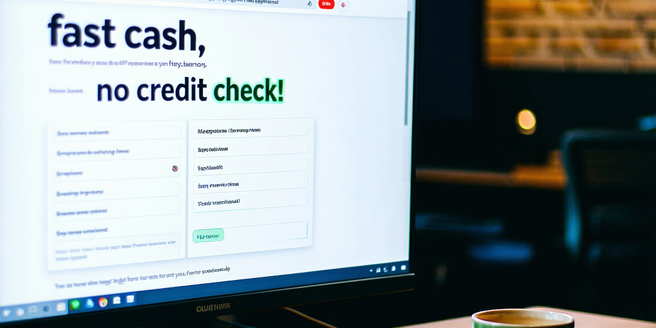
Understanding No Credit Check Loans and Their Risks
| Description | Risks | Alternatives |
| Often required by those with poor credit. | High interest rates and fees. | Credit counseling |
| Easy approval process. | Potential debt trap. | Secured loans |
| No credit score required. | Short repayment terms. | Credit unions |
| Quick cash availability. | Limited borrower rights. | Peer-to-peer lending |
| Used for emergencies. | Impact on future creditworthiness. | Payday alternative loans |
| Convenient online applications. | Predatory lending practices. | Government programs |
Why People Opt for No Credit Check Loans
Many individuals turn to no credit check loans primarily due to concerns regarding their credit scores. With traditional lenders often putting a heavy emphasis on creditworthiness, borrowers who have a less than stellar credit history find it challenging to secure funds during emergencies. These loans provide a viable solution by not delving into an individual’s financial past, offering a sense of relief to those in urgent need of cash. Another reason many opt for these loans is the speed at which they can secure funds. No credit check loans typically have a quick turnaround time, with some lenders providing instant access to cash. This immediacy is crucial for those facing financial hardships, such as unexpected medical expenses or urgent car repairs. Furthermore, the application process is generally straightforward and less cumbersome than traditional loans, which often require a wealth of documentation and paperwork.
Exploring Credit Union Loan Options
Credit unions offer a community-focused alternative for those seeking financial assistance without resorting to no credit check loans. These member-owned institutions generally provide more favorable terms compared to traditional banks, including lower interest rates and more flexible repayment schedules. Many credit unions evaluate loan applications with a more personalized approach, taking into consideration an applicant’s entire financial picture rather than just their credit score. This approach makes them a popular choice for those who might not have a strong credit history but are nonetheless reliable borrowers. Additionally, credit unions often offer financial education resources, helping members understand and improve their financial habits, thus, creating a pathway to better credit and financial stability. Whether you need a personal loan, a car loan, or even a small business loan, credit unions are a viable alternative worth considering.
The Benefits of Peer-to-Peer Lending
Peer-to-peer (P2P) lending platforms have surged in popularity as an alternative to traditional banking and no credit check loans. These online platforms connect borrowers directly with investors, cutting out the middleman and allowing for potentially lower interest rates. The process is notably more flexible, providing borrowers with a range of options suited to their specific needs and financial conditions. In terms of benefits, P2P lending often involves a quick and efficient application process, with decisions made rapidly due to the online nature of the service. Moreover, the competition among investors for reliable borrowers can further result in more competitive rates and terms for applicants. Borrowers with unusual financial circumstances might also find it easier to explain their situations to potential investors rather than facing strict eligibility criteria set by traditional lenders.
How Payday Alternative Loans Work
Payday Alternative Loans (PALs), offered by federal credit unions, provide a safer option for borrowers who may gravitate towards payday loans. These loans are specifically designed to avoid the predatory practices often associated with payday lending. PALs typically offer amounts ranging from $200 to $1,000 with a repayment term of one to six months, which is more manageable than the short-term nature of payday loans. Furthermore, PALs have capped application fees and interest rates which are considerably lower than those charged by traditional payday lenders. For individuals with an active and verified account with the credit union, PALs offer a feasible option to meet short-term cash needs without falling into the trap of severe financial cycles. This form of lending encourages a sustainable repayment pattern while offering members an avenue to gain better financial control.
Utilizing Secured Credit Cards for Financial Needs
Secured credit cards can be a strategic tool for those looking to build or rebuild their credit score while managing short-term financial needs. Unlike traditional credit cards, secured cards require the holder to provide a security deposit, which minimizes risk for the issuer and provides a line of credit for the user. This setup makes them accessible to individuals with poor or no credit history. When used responsibly, secured credit cards can help users demonstrate good credit habits, such as timely bill payments and maintaining a low credit utilization ratio, which can positively affect credit scores. Over time, responsible use of a secured card can lead to opportunities for better credit offers, including unsecured cards. Secured credit cards also typically come with low fees and clear terms, making them a transparent and reliable option for financing.
Getting Financial Help Through Personal Installment Loans
For individuals requiring a manageable pathway to financing, personal installment loans present a structured repayment plan that can aid in covering significant expenses without the drawbacks of a no credit check loan. These loans offer a lump sum that can be repaid over favorable periods through regular installments, ranging from months to years based on the loan agreement. Lenders typically provide a fixed interest rate, meaning your monthly payment stays consistent throughout the duration of the loan, aiding in financial planning and stability. Personal installment loans are available through banks, credit unions, and online lenders, each offering varying terms and conditions. Properly assessing these options can significantly help borrowers manage cash flow and pay off substantial expenses such as medical bills, home repairs, or education fees in a sustainable manner.
Using Home Equity Loans as an Alternative
Home equity loans present a viable alternative to those contemplating no credit check loans, specifically for homeowners with significant equity. These loans allow you to borrow against the equity of your home, often at lower interest rates compared to unsecured loans or credit cards. Home equity loans provide a lump sum of money, which can be used for extensive projects like home renovations, debt consolidation, or education expenses. However, they do require the homeowner to put their property on the line, introducing a degree of risk. Therefore, it is crucial for individuals to have a clear and feasible repayment plan when opting for this type of financing. On a positive note, the interest paid on home equity loans can sometimes be tax-deductible, further enhancing their appeal as a strategic financial tool.
Community-Based Lending Programs
Community-based lending programs serve as a grassroots approach to financial support, emphasizing local collaboration and trust-based partnerships. These programs are typically aimed at individuals who have limited access to traditional banking services, offering a solution without resorting to high-interest, no credit check avenues. Many community lending initiatives are spearheaded by local nonprofits, government agencies, or community groups that understand the specific needs and circumstances of the area’s residents. By pooling resources within the community, these programs can extend low-interest loans or grants to help with living expenses, business initiatives, or educational opportunities. This not only provides immediate financial relief but also fosters economic growth and empowerment within the community by investing in local talent and entrepreneurship.
Government Assistance and Grant Opportunities
Government assistance and grant opportunities offer crucial financial lifelines that serve as alternatives to high-cost borrowing options like no credit check loans. These programs are designed to provide individuals and families in financial distress with relief, covering specific needs such as housing, education, medical expenses, or business ventures. Different government levels, from federal to local, offer various initiatives targeting diverse populations, including veterans, students, and low-income families. Grant opportunities generally do not require repayment, easing the burden on recipients while enabling them to meet essential needs or achieve specific goals. It’s crucial to conduct thorough research to identify eligible programs that align with your circumstances, as understanding the specific requirements and deadlines for applications can greatly influence your success in acquiring such assistance.

